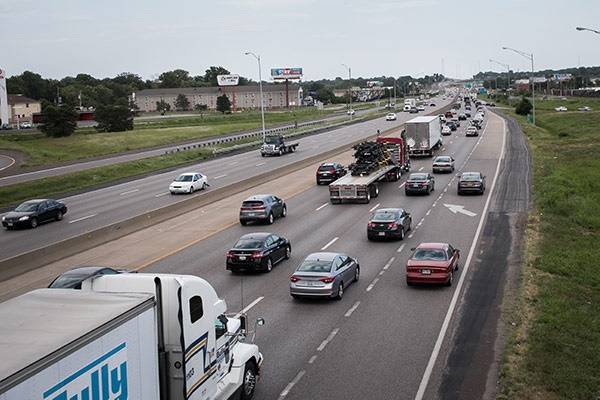St. Louis Regional Freightway: The Year in Review
The St. Louis Regional Freightway has compiled a summary of the major developments over the past year that either elevated the St. Louis region’s global status as a world-class freight hub or will help to advance the region’s position as the country’s freight nexus in the year ahead.
“From mega projects breaking ground and global companies choosing to invest here, to newly formed partnerships that strengthen the bi-state region’s role in national and global supply chains, there was much to be excited about in 2019,” said Mary Lamie, Executive Vice President of Multi-Modal Enterprises for Bi-State Development, which oversees the St. Louis Regional Freightway as one of its enterprises.
While Lamie notes there were dozens of announcements or developments that contribute to the organization’s optimism for the future, the St. Louis Regional Freightway narrowed its list to focus in on just a sampling of the most significant that relate to the region’s freight network or infrastructure.
Following is a look at some of the highlights:
Investments in Priority Infrastructure Projects Top $1 Billion
It is difficult to tally up every infrastructure project that was funded or under construction in 2019, but based on the St. Louis Regional Freightway’s tracking, more than $1 billion in critical projects are moving forward. These projects have been identified as priorities for the St. Louis region by business and industry leaders in the private sector, in addition to local and state officials, the Missouri and Illinois Departments of Transportation (DOT) and the East-West Gateway Council of Governments Board of Directors. These projects are supported by combination of state and federal funding and private investment and include:
- MoDOT’s $278 million project to overhaul an eight-mile stretch of Interstate 270 - its largest project in a decade. An additional $84.5 million was allocated for work on I-270 in Madison County, Ill., as part of IDOT’s annual Multi-Year Improvement Program. These add to $500 million in work already underway on this major logistics corridor to meet growing needs of manufacturing and logistics companies that use the corridor and do not see the Mississippi River as a barrier.
- The $222 million project to replace the 129-year old Merchants Bridge, a vital artery across the Mississippi River and one of the nation’s primary east-west rail corridors serving the nation’s 3rd largest rail hub. The new double track bridge will help move freight faster, cost-effectively and more reliably, providing an alternative to more congested rail regions like Chicago. The project is being funded by the Terminal Railroad Association of St. Louis.
- The new $59 million Interstate 255/Davis Street Ferry Road Interchange in St. Clair County, Ill., which will play a key role in facilitating growth of Union Pacific Railroad’s intermodal yard by reducing travel times and lowering transportation costs.
- Projects included in Missouri Gov. Parson’s just announced Cost Share Program, including $4.7 million to improve Route A serving the GM Wentzville Assembly Plant and to add an additional lane on I-70 in O’Fallon, Mo., to provide additional capacity and improved traffic flow at freeway bottleneck locations.
Industrial Real Estate Sector Thrives
The St. Louis region’s industrial sector continued to shine in 2019, with new data underscoring the dramatic recent growth being fueled by the availability of space and speed of delivery, an available, job-ready workforce, and exceptional freight assets. Examples include:
- Manufacturers of varying sizes continue to invest in the region, led by GM which will invest $1.5 billion at its Wentzville facility, retaining 4,000 jobs. Boeing Co. has announced a $70 million expansion of its missile and munitions plant in St. Charles, Mo., while 2019 also saw the expansion of Boeing’s operations at MidAmerica St. Louis Airport in St. Clair County, Ill., the designated test site for Boeing’s MQ-25TM Autonomous Air Refueling Platform, which successfully completed the first test flight in September. Melton Machine & Control Co., announced a new 42-acre headquarters and manufacturing campus in Washington, Mo., where it will manufacture automated robotic welding equipment for the automotive industry.
- Since 2014, more than 25 million square feet of new industrial space has been constructed or is currently under construction in the St. Louis, Mo. region, and more than 75% of that represents buildings topping 250,000 square feet. Much of this construction has been focused on the north Interstate I-270 Corridor - a major logistics corridor for local and national manufacturers, suppliers and distributors that spans two states.
- Elsewhere in the region, Missouri’s first Amazon fulfillment center opened in St. Peters, Mo., at Premier 370 Industrial Park. That is also where Medline, a manufacturer and distributor of medical supplies, acquired 52 acres to build an 811,000 sq. ft. building. Fenton Logistics Park in South St. Louis County – site of the former Chrysler plant - also continued to welcome new tenants and grow, reaching 648,411 square feet of completed space this past summer. In North County, Aviator Business Park in Hazelwood will soon be home to an additional 640,182 square feet of speculative distribution space. NorthPoint and Exeter both entered the Metro East market for the first time adding a 543,000-square-foot and a 675,000-square-foot building respectively.
St. Louis Region’s Position as a World Class Logistics Hub Enhanced
Since 2015, the St. Louis Regional Freightway has been elevating awareness of the region’s incredible freight assets, which include being home to one of America’s largest inland ports with the northern most ice-free and lock-free access on the Mississippi River to and from the Gulf; four interstates with national access; five airports with capacity, and six Class I railroads. As the region continues to move up in key rankings and distinguish itself based on other unique factors, it garnered nearly $518,000 in local, regional and national media coverage during the calendar year.
- The U.S. Army Corps of Engineers reaffirmed in 2019 that the St. Louis region’s port system remains the most efficient inland port in the nation, and its latest numbers reveal that, in 2018, St. Louis’ inland port system moved up in the rankings to become the 2nd largest inland port system. It handled more than 37.4 million tons of commodities, just 1.1 million tons shy of the number one slot.
- A 15-mile section of the Mississippi River in the St. Louis region delivers the highest level of grain barge handling anywhere along the Mississippi River. Now, thanks to a new partnership forged in 2019 between the St. Louis Regional Freightway, 39 North and World Trade Center of St. Louis, this “Ag Coast of America” is expanding and leveraging the region’s strategic location in the center of the world’s agriculture production and its leadership in agriculture technology (agtech) research, production and transportation to lead the world in addressing global food security concerns.
- 2019 also saw the St. Louis Regional Freightway and the Port of Savannah forge a partnership to create a new connection between the St. Louis, Mo., region and the largest single-terminal container facility in the western hemisphere. The growing Port of Savannah has identified the St. Louis region as a key import/export market to which containers can consistently be distributed by rail at a lower cost for shippers. Meanwhile, Missouri Governor Michael Parson visited the Mississippi River town of Herculaneum, Mo., in August to find out more about statewide efforts to deliver a new option to transport freight along the inland waterways and the role an innovative waterway vessel could play in moving larger volumes of goods and commodities affordably and efficiently along both the Mississippi River and Missouri River and their tributaries.
Region Welcomes Expanded Presence of Global and Growing Corporations
Bayer’s $60 billion merger with Monsanto in 2018 made Missouri the number one state in the nation for Foreign Direct Investment; and 2019 saw additional commitments from Bayer and other global companies and growing domestic firms on track to have an impact globally.
- Bunge recently announced plans to relocate its global headquarters from New York to the St. Louis region as it seeks to leverage the agriculture production and distribution already concentrated in this area and the Mississippi River and its tributaries, which are key to the company’s export market.
- Bayer AG announced this past summer that it would be moving 500 agtech jobs to Creve Coeur, Mo., where the company plans to invest $164 million to expand and improve its facilities.
- Fast-growing Benson Hill Biosystems – a plant science company - is also growing and building a new headquarters in the 39 North district in Creve Coeur, Mo., where it hopes to accommodate up to 300 employees.


















